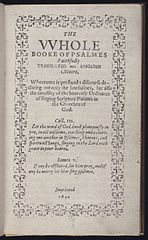 Last week, a new record was set with the sale of the Bay Psalm Book at 14.2 million dollars. The Bay Psalm Book is a rare translation of biblical Psalms from 1640, and the first English language book ever printed in North America. The recent sale is one of eleven surviving copies, and was (one of two) owned by the Old South Church in Boston before being auctioned at Sotheby’s.
Last week, a new record was set with the sale of the Bay Psalm Book at 14.2 million dollars. The Bay Psalm Book is a rare translation of biblical Psalms from 1640, and the first English language book ever printed in North America. The recent sale is one of eleven surviving copies, and was (one of two) owned by the Old South Church in Boston before being auctioned at Sotheby’s.
Some other highly valued sales:
The Birds of America (1827-1838) by John James Audubon
$11.5 million in December 2010
The Canterbury Tales (1478) by Geoffrey Chaucer
$7.5 million in 1998
First Folio (1623) by William Shakespeare
$6.1 million in 2001
The Gutenberg Bible (1459-1455)
$4.9 million in 1987
Traité des Arbres Fruitiers (1768) by Henri-Louis Duhamel du Monceau
$4.5 million in 2006
How much would you pay for a piece of printed history?